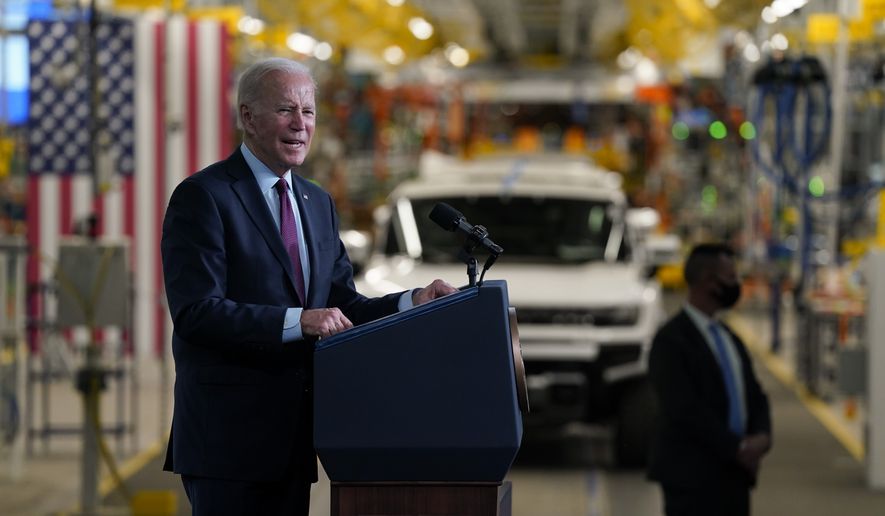President Biden’s alliance with labor unions was on display on Wednesday with a proposal favoring union shops in his push for electric vehicles, snubbing Tesla and other nonunion plants while promoting his infrastructure programs and offering extra federal subsidies only for cars assembled at union factories.
Speaking on the floor of the General Motors “Factory Zero” electric-vehicle facility in Detroit, Mr. Biden emphasized his close ties with unions. He also touted how the $1.2 trillion infrastructure bill he signed into law this week would benefit labor, one of his biggest backers.
“We are going to kick-start batteries, materials and parts production and recycling, boosting the manufacturing of clean vehicles with new loans and new tax credits,” Mr. Biden said, “creating new purchase incentives for consumers to buy American-made, union-made clean vehicles.”
Mr. Biden hailed a proposed tax credit that would give automakers with union workers a leg up in the rapidly growing electric vehicle market. The president said the proposal would benefit the environment and blue-collar workers by rewarding union shops for transitioning to electric vehicles.
Automakers with nonunion facilities and lawmakers from states where those plants are located are crying foul. They say the tax credit rewards unions for supporting Mr. Biden during the 2020 election at the expense of nonunion workers.
“The union bosses are the big bankrollers of the Democratic Party,” Sen. Bill Hagerty, Tennessee Republican, told The Washington Times. “Democrats will sacrifice jobs, they will sacrifice the economy and they will even sacrifice their climate goals to pay off their union bosses.”
At issue is a proposal tucked inside Mr. Biden’s massive $1.8 trillion social welfare and climate bill, set for a House vote this week. If the bill is enacted, the provision will provide a $7,500 tax credit for consumers who purchase electric vehicles through 2026.
Car buyers would qualify for an additional tax credit of $4,500 if they purchase a vehicle manufactured at a U.S. plant that operates under a union-negotiated bargaining agreement.
Only auto plants owned by General Motors, Ford Motor Co. and Stellantis NV would currently qualify for the additional tax incentive.
The tax credit would not cover a majority of the electric vehicles on the road today, and it would disadvantage nonunion automobile manufacturers such as Toyota and Tesla.
Tennessee is home to several nonunion automobile plants, including Volkswagen’s ID.4 factory in Chattanooga. If the tax incentive is enacted, Mr. Hagerty said, it will harm workers in Tennessee, a right-to-work state.
“This is an incentive to move production to a unionized plant,” he said. “It makes it harder for us to attract the next electric vehicle plant in Tennessee.”
Some in Mr. Biden’s party also have fumed over the extra $4,500 tax credit.
Sen. Joe Manchin III, West Virginia Democrat, is a centrist who has threatened to block Mr. Biden’s massive spending bill. In an interview with Automotive News, Mr. Manchin said incentivizing the purchase of electric vehicles from union shops would be “un-American” and “wrong.”
“We should not use everyone’s tax dollars to pick winners and losers,” Mr. Manchin told the auto industry trade publication.
White House deputy press secretary Christopher Meagher defended the tax incentive by saying it would provide workers with good jobs, good wages and good benefits.
“There’s a history — a long history of using tax credits to incentivize choices, and that’s true here,” Mr. Meagher told reporters. “They’ll lower the cost of EVs by $12,500 for a middle-class family. They’ll bolster domestic manufacturing supplies across the country. And they’ll position America to outcompete the world when it comes to EVs.”
When asked why the administration was incentivizing General Motors workers over employees at nonunion plants, Mr. Meagher again said it was about creating jobs.
“A big part of the president’s climate strategy is about jobs,” he said. “And he believes that you can do both: You can move forward in pushing an economy that will think about the impact on climate while also producing jobs and — and creating good-paying union jobs to make those goals, to make those EV plug-ins around the country.”
Still, nonunion automakers say they employ tens of thousands of U.S. workers and should not be unfairly disincentivized.
Tesla CEO Elon Musk said in a Twitter message that Mr. Biden was a “puppet” for the United Auto Workers, the massive union that plays a significant role in the liberal wing of the Democratic Party.
Toyota took out a full-page ad in national newspapers urging lawmakers not to “play politics with the environment.”
It’s not the first time Mr. Musk has sparred with Mr. Biden. In August, the White House snubbed Mr. Musk at a meeting on electric vehicles with UAW officials and automobile executives.
“Didn’t mention Tesla once and praised GM and Ford for leading the EV revolution. Does this sound maybe a little biased or something?” Mr. Musk said.
• Jeff Mordock can be reached at jmordock@washingtontimes.com.




Please read our comment policy before commenting.